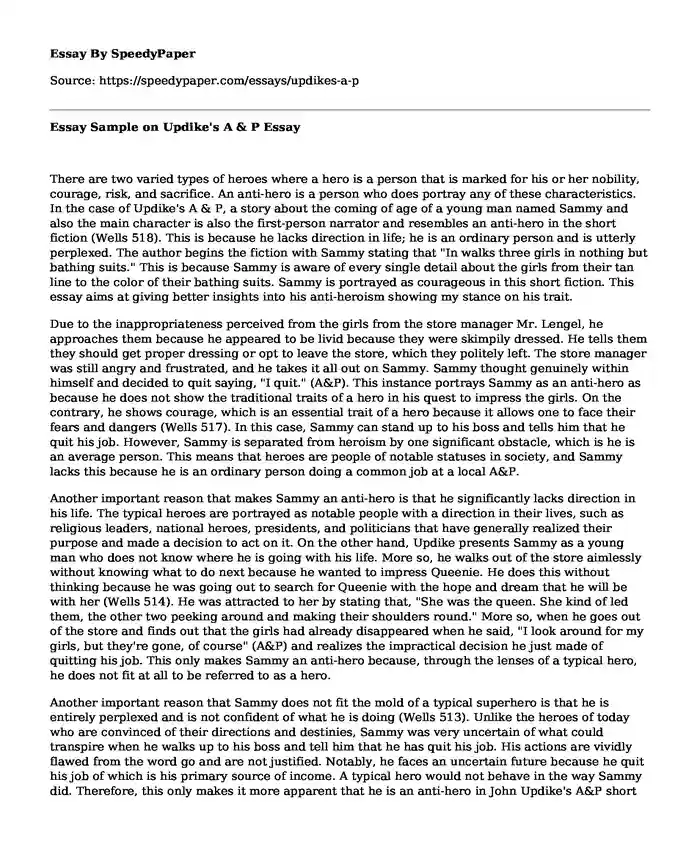There are two varied types of heroes where a hero is a person that is marked for his or her nobility, courage, risk, and sacrifice. An anti-hero is a person who does portray any of these characteristics. In the case of Updike's A & P, a story about the coming of age of a young man named Sammy and also the main character is also the first-person narrator and resembles an anti-hero in the short fiction (Wells 518). This is because he lacks direction in life; he is an ordinary person and is utterly perplexed. The author begins the fiction with Sammy stating that "In walks three girls in nothing but bathing suits." This is because Sammy is aware of every single detail about the girls from their tan line to the color of their bathing suits. Sammy is portrayed as courageous in this short fiction. This essay aims at giving better insights into his anti-heroism showing my stance on his trait.
Due to the inappropriateness perceived from the girls from the store manager Mr. Lengel, he approaches them because he appeared to be livid because they were skimpily dressed. He tells them they should get proper dressing or opt to leave the store, which they politely left. The store manager was still angry and frustrated, and he takes it all out on Sammy. Sammy thought genuinely within himself and decided to quit saying, "I quit." (A&P). This instance portrays Sammy as an anti-hero as because he does not show the traditional traits of a hero in his quest to impress the girls. On the contrary, he shows courage, which is an essential trait of a hero because it allows one to face their fears and dangers (Wells 517). In this case, Sammy can stand up to his boss and tells him that he quit his job. However, Sammy is separated from heroism by one significant obstacle, which is he is an average person. This means that heroes are people of notable statuses in society, and Sammy lacks this because he is an ordinary person doing a common job at a local A&P.
Another important reason that makes Sammy an anti-hero is that he significantly lacks direction in his life. The typical heroes are portrayed as notable people with a direction in their lives, such as religious leaders, national heroes, presidents, and politicians that have generally realized their purpose and made a decision to act on it. On the other hand, Updike presents Sammy as a young man who does not know where he is going with his life. More so, he walks out of the store aimlessly without knowing what to do next because he wanted to impress Queenie. He does this without thinking because he was going out to search for Queenie with the hope and dream that he will be with her (Wells 514). He was attracted to her by stating that, "She was the queen. She kind of led them, the other two peeking around and making their shoulders round." More so, when he goes out of the store and finds out that the girls had already disappeared when he said, "I look around for my girls, but they're gone, of course" (A&P) and realizes the impractical decision he just made of quitting his job. This only makes Sammy an anti-hero because, through the lenses of a typical hero, he does not fit at all to be referred to as a hero.
Another important reason that Sammy does not fit the mold of a typical superhero is that he is entirely perplexed and is not confident of what he is doing (Wells 513). Unlike the heroes of today who are convinced of their directions and destinies, Sammy was very uncertain of what could transpire when he walks up to his boss and tell him that he has quit his job. His actions are vividly flawed from the word go and are not justified. Notably, he faces an uncertain future because he quit his job of which is his primary source of income. A typical hero would not behave in the way Sammy did. Therefore, this only makes it more apparent that he is an anti-hero in John Updike's A&P short fiction story.
Sammy is depicted as a courageous person for his actions of stepping up to his boss and facing his fears. However, he is an anti-hero as it is evident from his being a perplexed person, lacks direction in life, and is ordinary. More so, he does not want to accept the world as it is and it leads him to decide on impulse so that he can show support to people that are different and rebellious and does not even know them personally.
Work Cited
Wells, Walter. "John Updike's "A&P," Making Literature Matter: An anthology for readers and writers (1995): pp.512 - 516
Cite this page
Essay Sample on Updike's A & P. (2023, Jan 20). Retrieved from https://speedypaper.com/essays/updikes-a-p
Request Removal
If you are the original author of this essay and no longer wish to have it published on the SpeedyPaper website, please click below to request its removal:
- USEC Executive Summary Example
- Free Paper for You on Using Tact and Diplomacy in Treatment Groups
- Essay Sample Dedicated to Tuscany Region
- Paper Example: Religion and Religious Gender Roles Construct
- Free Essay Example - Freedom After WWII
- Free Essay: Gender Inequality in Sierra Leone
- Free Essay Example. Ethical Dilemma: Euthanasia
Popular categories





